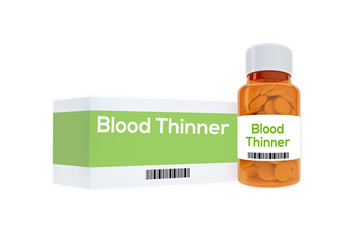Stopping Blood Thinners Before Cosmetic Surgery
 Cosmetic surgery can be a great way to improve your appearance and boost your confidence. However, it is critical to be aware of the potential risks and complications that may arise during and after the procedure. Blood thinners are a significant risk factor because they increase the risk of bleeding and other complications during and after surgery. If you are taking blood thinners and plan to have cosmetic surgery, it is critical that you discuss the potential risks with board-certified plastic surgeon Dr. Azouz and follow his recommendations for stopping the medication prior to the procedure.
Cosmetic surgery can be a great way to improve your appearance and boost your confidence. However, it is critical to be aware of the potential risks and complications that may arise during and after the procedure. Blood thinners are a significant risk factor because they increase the risk of bleeding and other complications during and after surgery. If you are taking blood thinners and plan to have cosmetic surgery, it is critical that you discuss the potential risks with board-certified plastic surgeon Dr. Azouz and follow his recommendations for stopping the medication prior to the procedure.
Blood thinners, also known as anticoagulants, are medications used to prevent the formation of blood clots or treat existing blood clots. They work by interfering with the natural clotting process of the blood and can be used to treat a variety of conditions, such as deep vein thrombosis, pulmonary embolism, atrial fibrillation, and heart attacks. Blood thinners that are commonly used include:
- Warfarin (Coumadin): Warfarin is an oral anticoagulant that has been used for many years. It works by preventing the liver from producing vitamin K-dependent clotting factors.
- Heparin: Heparin is a strong anticoagulant that is frequently used in hospitals to treat blood clots. It works by binding to and activating antithrombin, a naturally occurring protein in the blood that inhibits clotting.
- Low molecular weight heparin (LMWH): LMWH is a newer type of heparin with a lower risk of bleeding that is frequently used to prevent blood clots after surgery or in patients with certain medical conditions.
- Direct oral anticoagulants (DOACs): DOACs are a more recent class of oral anticoagulants, including apixaban (Eliquis), rivaroxaban (Xarelto), and dabigatran (Pradaxa). They function by inhibiting specific blood clotting factors.
- Aspirin: Although not as strong as some other blood thinners, aspirin can have anticoagulant effects and is frequently prescribed to patients with certain risk factors to prevent heart attacks and strokes.
It is important to note that blood thinners can increase the risk of bleeding, so it is critical to carefully follow your doctor’s instructions when taking these medications. It’s also a good idea to let your doctor know if you’re taking any other medications or supplements, as some can interact with blood thinners and increase the risk of bleeding and bruising, which can be a major concern during cosmetic surgery.
Several herbal medications are known to have blood-thinning properties, which means they can increase the risk of bleeding and other complications when used in conjunction with other blood-thinning medications or before surgery. Some examples include:
- Garlic: Garlic is a popular herbal supplement with a variety of health benefits, including blood-thinning properties. It contains allicin, a compound that has been shown to have antiplatelet effects and can aid in the prevention of blood clot formation.
- Ginkgo biloba: Ginkgo biloba is a herb used to improve cognitive function and memory. It also has blood-thinning properties, which can increase the likelihood of bleeding and bruising.
- Ginseng: Ginseng is an adaptogenic herb that is commonly used to relieve stress and boost energy. It also has blood-thinning properties and can increase the risk of bleeding, especially when used in conjunction with other blood-thinning medications.
- Turmeric: Turmeric is a spice commonly used in Indian cuisine, and it is also available as a supplement. It contains curcumin, which has anti-inflammatory and blood-thinning properties.
- Fish oil: Fish oil supplements are frequently recommended because of their high omega-3 fatty acid content, which has been linked to a variety of health benefits. Omega-3 fatty acids, on the other hand, have blood-thinning properties and may increase the risk of bleeding.
It’s critical to consult with board-certified plastic surgeon Dr. Azouz before beginning any herbal supplements, especially before plastic surgery. Dr. Azouz can advise you on how to safely manage your medications before and after surgery and can help you determine if any of the supplements you are taking may increase your risk of bleeding or other complications.
To reduce the risk of bleeding and other complications during and after surgery, it is often necessary to temporarily stop taking blood thinners prior to the procedure. The specific timing for discontinuing blood thinners will be determined by several factors, including the medication you are taking, the type of surgery you will be undergoing, and your individual risk factors for bleeding. Dr. Azouz will carefully review your medical history and medications to determine the best time and duration to discontinue blood thinners before cosmetic surgery. Dr. Azouz can also coordinate with your hematologist to assure proper anticoagulation around your surgery.
In some cases, you may need to stop taking blood thinners several days or even weeks before the procedure to allow your blood to return to its normal clotting function. It is critical to carefully follow Dr. Azouz’s instructions on when to temporarily discontinue blood thinners prior to cosmetic surgery. This may entail gradually reducing the medication’s dosage over time or temporarily switching to a different medication with a shorter half-life that is easier to manage during the surgery. In some cases, you may need to resume taking blood thinners after surgery to prevent blood clots from forming. Dr. Azouz will closely monitor your recovery after surgery to ensure that there are no complications from blood thinners.
Posted on behalf of
